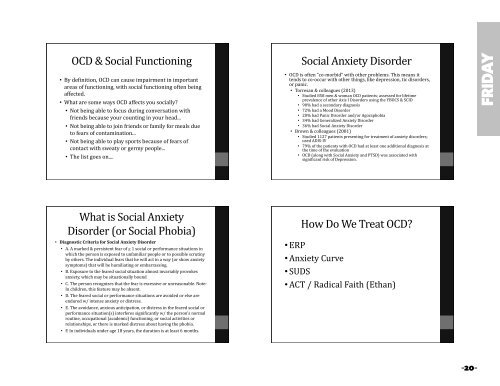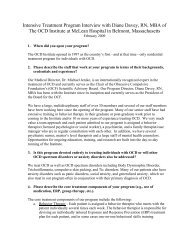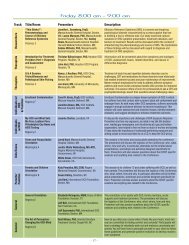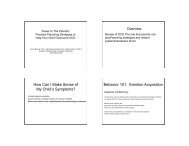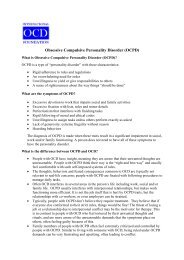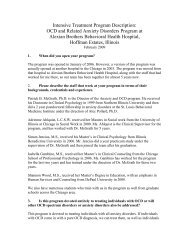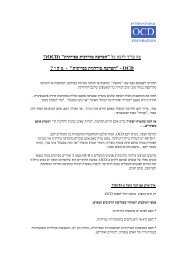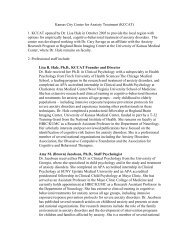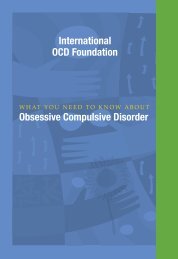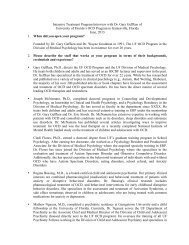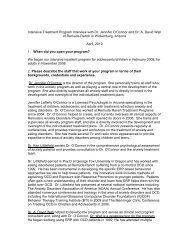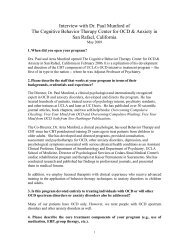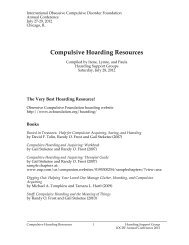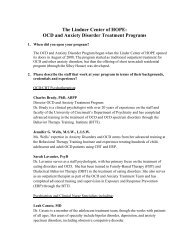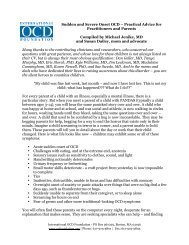perfectionism and - Obsessive-Compulsive Foundation
perfectionism and - Obsessive-Compulsive Foundation
perfectionism and - Obsessive-Compulsive Foundation
Create successful ePaper yourself
Turn your PDF publications into a flip-book with our unique Google optimized e-Paper software.
6/14/13 <br />
OCD & Social Functioning <br />
• By deDinition, OCD can cause impairment in important <br />
areas of functioning, with social functioning often being <br />
affected. <br />
• What are some ways OCD affects you socially <br />
• Not being able to focus during conversation with <br />
friends because your counting in your head... <br />
• Not being able to join friends or family for meals due <br />
to fears of contamination... <br />
• Not being able to play sports because of fears of <br />
contact with sweaty or germy people... <br />
• The list goes on.... <br />
Social Anxiety Disorder <br />
• OCD is often “co-‐morbid” with other problems. This means it <br />
tends to co-‐occur with other things, like depression, tic disorders, <br />
or panic. <br />
• Torresan & colleagues (2013) <br />
• Studied 858 men & woman OCD patients; assessed for lifetime <br />
prevalence of other Axis I Disorders using the YBOCS & SCID <br />
• 90% had a secondary diagnosis <br />
• 72% had a Mood Disorder <br />
• 20% had Panic Disorder <strong>and</strong>/or Agoraphobia <br />
• 34% had Generalized Anxiety Disorder <br />
• 36% had Social Anxiety Disorder <br />
• Brown & colleagues (2001) <br />
• Studied 1127 patients presenting for treatment of anxiety disorders; <br />
used ADIS-‐IV <br />
• 79% of the patients with OCD had at least one additional diagnosis at <br />
the time of the evaluation <br />
• OCD (along with Social Anxiety <strong>and</strong> PTSD) was associated with <br />
signiDicant risk of Depression. <br />
FRIDAY<br />
What is Social Anxiety <br />
Disorder (or Social Phobia) <br />
• Diagnostic Criteria for Social Anxiety Disorder <br />
• A. A marked & persistent fear of > 1 social or performance situations in <br />
which the person is exposed to unfamiliar people or to possible scrutiny <br />
by others. The individual fears that he will act in a way (or show anxiety <br />
symptoms) that will be humiliating or embarrassing. <br />
• B. Exposure to the feared social situation almost invariably provokes <br />
anxiety, which may be situationally bound <br />
• C. The person recognizes that the fear is excessive or unreasonable. Note: <br />
In children, this feature may be absent. <br />
• D. The feared social or performance situations are avoided or else are <br />
endured w/ intense anxiety or distress. <br />
• E. The avoidance, anxious anticipation, or distress in the feared social or <br />
performance situation(s) interferes signiDicantly w/ the person's normal <br />
routine, occupational (academic) functioning, or social activities or <br />
relationships, or there is marked distress about having the phobia. <br />
• F. In individuals under age 18 years, the duration is at least 6 months. <br />
How Do We Treat OCD <br />
• ERP <br />
• Anxiety Curve <br />
• SUDS <br />
• ACT / Radical Faith (Ethan) <br />
-20-<br />
2


